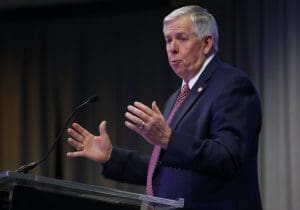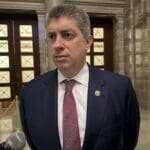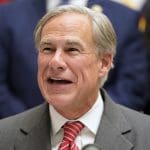GOP governor complains about 'dramatic' effort to fight coronavirus
Republican Gov. Mike Parson is still refusing to issue a statewide stay-at-home order, even as the outbreak worsens.

Missouri Gov. Mike Parson has been slow to respond to the coronavirus outbreak in his state, and now his allies in the state Senate are publicly resisting efforts to keep residents safe.
On Wednesday, the U.S. surgeon general advised that social distancing and staying at home were the best ways to prevent further spread of the coronavirus.
Parson has refused to issue a stay-at-home order thus far.
State Sen. Ed Emery, a Republican, recently compared social distancing with authoritarian government overreach.
“With social distancing, limited gatherings to no more than 10 and forced business closings under government threat, it seems as if governments have moved from informing to ordering,” he wrote in a March 27 newsletter post on the Senate’s official website.
Emery, who endorsed Parson’s run for governor in 2019, hoped that people would “reject having government direct our lives at the expense of our liberty” lest “we think ourselves more helpless than ever without government and submit to even more collectivist central planning.”
Emery is “wrong on the facts,” his newsletter was “appalling,” and he “seems to think the coronavirus is some Marxist plot,” the editorial board of the Kansas City Star wrote after the post was published.
In late March, State Sen. Cindy O’Laughlin praised Parson for resisting efforts to “shut everyone down” to stem the spread of the pandemic.
In a March 22 Facebook post viewed by the St. Louis Post-Dispatch, O’Laughlin, who also endorsed Parson in 2019, wrote, “I see no time in the history of this country when perfectly healthy people have been basically confined to their homes or only able to do essential things as in Kansas City or St. Louis. Frankly I consider this unconstitutional and it needs (to be) challenged.”
Parson, Emery, and O’Laughlin are ignoring the pleas of the Missouri State Medical Association, which called on Parson to issue a stay-at-home order on March 23.
“If things progress as is, COVID-19 patients will deplete the state’s available hospital beds, ventilators, and precious personal protection equipment,” the group wrote. “Any additional time without a ‘shelter-in-place’ requirement wastes crucial health care resources, including manpower.”
Parson has refused to issue such an order, saying he fears it would hurt the state economically.
“The effects that’ll have on everyday people are dramatic,” Parson said on March 26. “That means businesses will close, people will lose their jobs, the economy will be in worse shape than ever.”
However, a study of cities that experienced the 1918 flu epidemic found that those that implemented more aggressive social distancing policies saw quicker economic recovery after the pandemic.
In contrast to Parson’s approach, Emil Verner, an assistant professor of finance at the Massachusetts Institute of Technology, said he and the study’s co-authors found “no evidence that cities that acted more aggressively in public health terms performed worse in economic terms. If anything, the cities that acted more aggressively performed better.”
Between last week and this week, Missouri reported a 600% increase in the number of confirmed coronavirus cases, the largest increase in the nation over that time period, according to the St. Louis Post-Dispatch. The neighboring state of Illinois, which had a stay-at-home order in place, saw the number of infections grow by 237%.
At least 16 people in Missouri have died from the virus as of Wednesday afternoon.
States that have taken aggressive action, such as stay-at-home orders, are able to “flatten their curve” of infection rates, Surgeon General Jerome Adams said Wednesday morning, adding that it “usually takes about three to four weeks from the time you start to lean into it before you level off.”
As of Wednesday afternoon, there were at least 205,000 confirmed cases in the United States, according to the New York Times. At least 4,540 people have died.
Published with permission of The American Independent Foundation.
Recommended

SC governor to sign bill banning hormone therapy for transgender youth into law
Treatments for youth already taking the drugs could be gradually taken off them through Jan. 31
By Skylar Laird, South Carolina Daily Gazette - May 09, 2024
Ohio Gov. DeWine said he didn’t know of millions in FirstEnergy support. Is it plausible?
Ohio Gov. Mike DeWine’s claim to not know about the millions an Akron utility spent supporting his 2018 campaign for governor simply isn’t credible, an Ohio political scientist said in a recent interview. A spokesperson for DeWine pushed back. FirstEnergy provided that support, then spent more than $60 million to pass and protect a $1.3 billion ratepayer-financed […]
By Marty Schladen, Ohio Capital Journal - April 29, 2024
Missouri governor hopeful Bill Eigel rejects affordable childcare proposal
Eigel has previously supported stripping funds from public schools and once opposed an expansion of early kindergarten.
By Jesse Valentine - April 15, 2024










































































